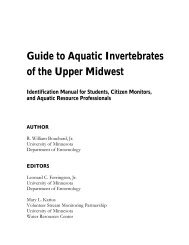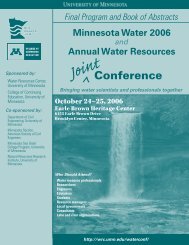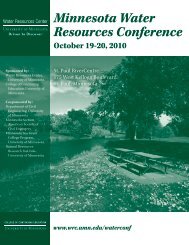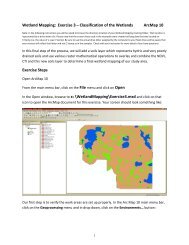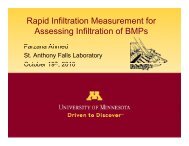Great Lakes Regional Water Program Great Lakes Regional Water
Great Lakes Regional Water Program Great Lakes Regional Water
Great Lakes Regional Water Program Great Lakes Regional Water
Create successful ePaper yourself
Turn your PDF publications into a flip-book with our unique Google optimized e-Paper software.
<strong>Regional</strong> <strong>Program</strong>ming Success Story<br />
Building the Capacity of E. coli Monitoring by<br />
Volunteer Networks: A Multi-State Effort<br />
7<br />
SITUATION:<br />
The public is demanding increased water quality monitoring to ensure that waters are protected from agricultural<br />
and urban runoff that may lead to elevated pathogen levels. At the same time, citizens and volunteers often gather and<br />
distribute water quality sample data without an understanding of pollutant sources or proper sampling techniques.<br />
A comprehensive training program on bacteria sampling for volunteer monitors was needed to address these concerns.<br />
Furthermore, an evaluation of the best test kit methods (based on usability, accuracy and preference) for volunteer<br />
monitors to use was needed. This project builds upon the strengths of Cooperative Extension Volunteer Monitoring<br />
<strong>Program</strong>s in six states in the Upper Midwest (Minnesota, Wisconsin, Michigan, Iowa, Indiana and Ohio) to train citizen<br />
volunteers specifically in the collection of water samples for bacterial testing. A multi-state steering team is working to<br />
evaluate results, build in-state support, and create training materials in order to build the capacity of volunteer monitoring<br />
networks to properly collect bacteria water quality data. Nationally, only 8 of the 26 volunteer monitoring programs<br />
sponsored or co-sponsored by Cooperative Extension currently test for bacteria (National Volunteer Monitoring Facilitation<br />
Project, 2003).<br />
ACTION:<br />
The goals of the project are to:<br />
7 Build the capacity of volunteer monitoring programs to understand and use the most appropriate<br />
E. coli testing protocols (test kits) and watershed-based sampling strategies with their volunteers.<br />
7 Develop a comprehensive training program for volunteers on E. coli testing in targeted watersheds<br />
in a six-state area.<br />
7 Develop and disseminate educational materials about E. coli and its associated health risks, sources<br />
and reasons for monitoring.<br />
7 Increase awareness and acceptance of the use of volunteer-collected water quality data in various<br />
watershed programs, including watershed assessments and TMDL development.<br />
7 Share results of the work with other states across the country, primarily via the National Volunteer<br />
Monitoring Facilitation Project efforts.<br />
7 Demonstrate how to set up an appropriate watershed-based E. coli sampling strategy utilizing<br />
volunteer networks and begin collecting usable data.<br />
12




